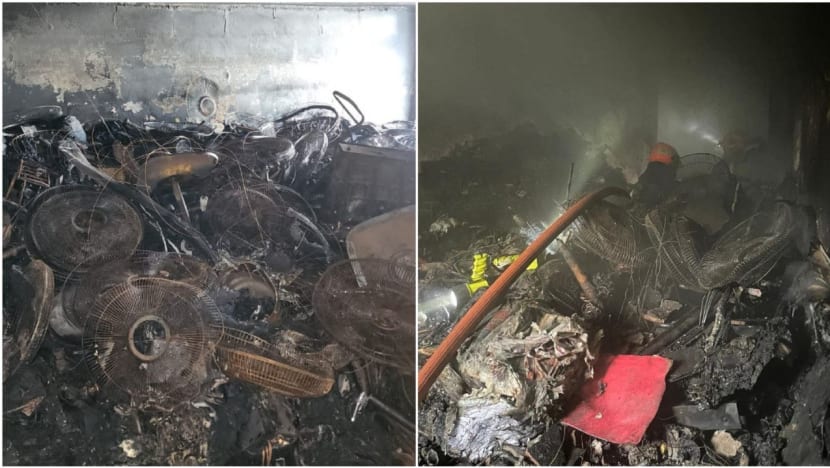260 hoarding cases remain unresolved due to difficulty in gaining hoarders’ cooperation: MND
After a fire in a Jurong East flat last month, SCDF said the firefighting operation was "very challenging" as it contained debris that was closely packed from wall to wall.

A fire broke out in a flat at Block 236, Jurong East St 21 on Aug 16, 2022. SCDF later said there was a large volume of debris closely packed from wall to wall. (Photo: SCDF)
SINGAPORE: The authorities are working on 260 active hoarding cases that remain "protracted and unresolved" because it is difficult to gain hoarders' cooperation to declutter, said Senior Minister of State for National Development Sim Ann on Monday (Sep 12).
"Frontline officers face real tensions on the ground in balancing between the person’s individual right to choose how they want to upkeep their own home and their neighbours’ enjoyment of their own residences, especially in cases where the clutter falls short of outright legal violations, or do not meet the threshold for public health and safety risks as determined by the Singapore Civil Defence Force (SCDF) and the National Environment Agency (NEA)," Ms Sim said in Parliament.
The questions from Members of Parliament (MPs) follow fires at HDB flats last month, including one at Jurong East Street 21 where a man died.
SCDF previously said that the firefighting and damping down operation for that incident was "very challenging" as the entire unit contained a large volume of debris that was closely packed from "wall to wall".
Ms Sim noted in her reply that the Government takes an interagency approach towards hoarding due to its complexity and the potentially fatal public hazards.
The Hoarding Management Core Group (HMCG) was set up in 2014 to coordinate efforts across the agencies. It comprises agencies such as the NEA, SCDF and HDB, among others.
Hoarding cases are assessed and prioritised based on whether there is a threat to public health and safety, said Ms Sim. Where risks are identified to the extent that rules and laws are violated, regulatory agencies will issue orders or take enforcement action on the hoarder or homeowner.
ROOT CAUSE
Ms Sim said: "The root cause of a hoarder’s behaviour is complex. For example, one’s hoarding could be a symptom of underlying mental health conditions like obsessive compulsive disorder (OCD), or developed after experiencing trauma or deep grief."
Hoarding behaviour could be worsened by social factors, such as family disputes or the stockpiling of collected items at home for a rag-and-bone business.
If a hoarder is suspected to have mental health issues, they will be referred to the Agency for Integrated Care and the Institute of Mental Health for professional assessment and treatment, said Ms Sim.
"Agencies work closely with healthcare workers, community partners, such as social workers, Family Service Centres, grassroots leaders, volunteers and the hoarder's family members in a concerted effort to resolve hoarding cases," she added.
She noted that even with the involvement of mental health agencies and professionals, these issues may still result in the recurrence of hoarding as behavioural change is "unlikely to happen overnight".
Despite the difficulties in dealing with hoarding cases, Ms Sim noted that the HMCG has managed to reduce the severity of 210 cases as of the first half of this year. The group continues to monitor these cases to prevent any recurrence.
For some cases that remain protracted and unresolved, officers need to get the cooperation of the hoarder to help them declutter.
This involves repeated engagements, persuasion, and sometimes, referrals to social workers or mental health professionals, said Ms Sim.
"We have encountered cases where hoarders refuse to open their door for inspections or cooperate in decluttering. Some may even threaten self-harm at the thought of losing their belongings," she added.
"Even if their homes were successfully decluttered once, the clutter may recur as habits do not change so quickly."
Ms Sim said that the authorities plan to intensify actions to keep corridors clear for passage.
"We will also continue to tackle known cases of egregious hoarding within flats. We will work with agencies to assess the risks posed by the worst hoarding cases.
"Where orders are issued for public health and safety reasons and hoarders are cooperative, we will proceed to declutter via the community-based approach with the assistance of volunteer groups," she said.











